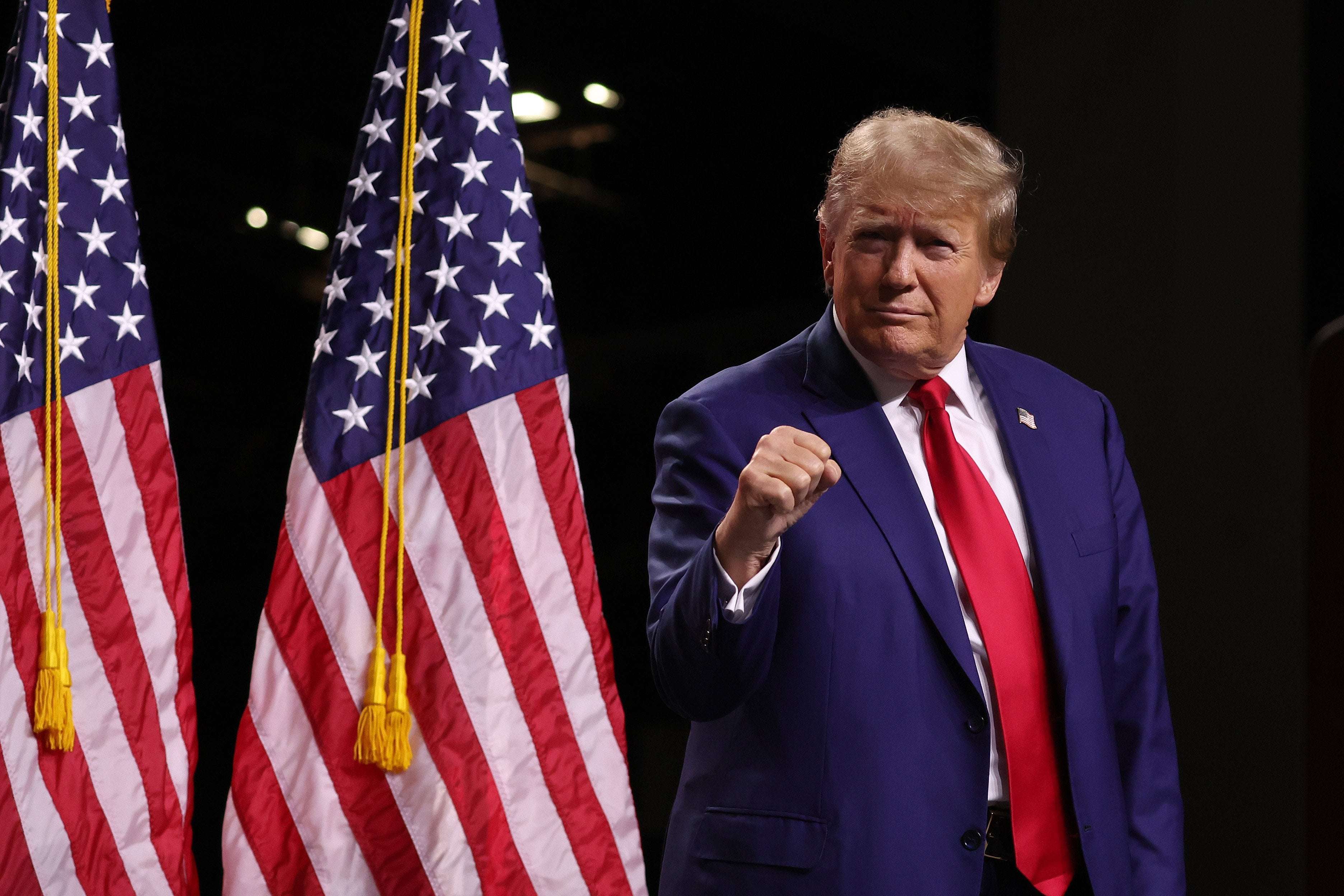Special Counsel Jack Smith urged a federal appeals court on Saturday to reject former President Donald Trump's claims that he is immune from prosecution.
Trump is accused of working to overturn the results of the 2020 election in the run-up to the violent riot at the U.S. Capitol by his supporters on January 6, 2021. He has denied any wrongdoing.
In a new brief filed with the U.S. Court of Appeals for the District of Columbia Circuit, prosecutors argued that Trump's claim that he cannot be held to account for crimes in office "threatens the democratic and constitutional foundation" of the country.
Trump's attorneys have argued that the appeals court should order the dismissal of the case because, as a former president, he is exempt from prosecution for acts that fell within his official duties as commander in chief. They also argued that Trump cannot face criminal charges because he was acquitted by the Senate after being impeached for the alleged conduct.
Donald Trump on December 17, 2023, in Reno, Nevada. The former president is facing four indictments on charges ranging from alleged interference in the 2020 election to the mishandling of classified documents. Justin Sullivan/Getty Images
In the brief, prosecutors wrote that the presidency "plays a vital role in our constitutional system, but so does the principle of accountability for criminal acts—particularly those that strike at the heart of the democratic process.
"Rather than vindicating our constitutional framework, the defendant's sweeping immunity claim threatens to license presidents to commit crimes to remain in office. The founders did not intend and would never have countenanced such a result."
Newsweek has contacted Trump's attorneys for comment via email.
The filing was submitted ahead of oral arguments scheduled for January 9.
Prosecutors are hoping a swift judgment rejecting Trump's arguments will keep the case on track for trial, currently scheduled to begin on March 4. All pretrial deadlines in the case have been on hold while Trump advances his immunity claims.
A lengthy appeals process would help Trump, the current frontrunner for the Republican presidential nomination, in his efforts to delay the case until after the 2024 election.
Though currently being heard by the appeals court, the matter is likely to come before the Supreme Court, which earlier in December rejected Smith's request for a speedy ruling.
Smith slyly notes that Trump himself previously told the S Ct in a case where he sought (unsuccessfully) immunity from a state grand jury subpoena that he wd NOT be immune post-Presidency and wd not be thereafter "above the law." Trump v. Vance. https://t.co/O3uollB7u9 — Andrew Weissmann (weissmann11 on Threads)🌻 (@AWeissmann_) December 30, 2023
Andrew Weissmann, a former federal prosecutor, noted on social media that Smith's filing is "VERY geared" toward a review by the high court.
In another post on X, formerly Twitter, Weissmann said that in the filing, Smith "slyly notes that Trump himself previously told the [Supreme Court] in a case where he sought (unsuccessfully) immunity from a state grand jury subpoena that he [would] NOT be immune post-presidency and [would] not be thereafter 'above the law.'"
Weissmann told Newsweek that he thought the filing "was written very much with an eye toward the Supreme Court and quickly getting there."
"I thought the request to have the appellate court truncate the issuance of the mandate to five days was smart, although I continue to be surprised that the [government] does not request the stay to be lifted" he said.
Weissmann and others also reacted to the hypotheticals that prosecutors listed of the implications of Trump's broad immunity theory
The filing claimed that Trump's assertation "would grant immunity from criminal prosecution to a president who accepts a bribe in exchange for directing a lucrative government contract to the payer; a president who instructs the FBI director to plant incriminating evidence on a political enemy; a president who orders the National Guard to murder his most prominent critics; or a president who sells nuclear secrets to a foreign adversary."
The brief also "skillfully used chilling and difficult hypotheticals to persuade the court to find that criminal immunity does not apply at all—as opposed to immunity within the outer perimeter of presidential functions," Weissmann said.
"Also: 'a president who sells nuclear secrets to a foreign adversary,'" attorney George Conway wrote to his 2.2 million followers on X. "Interesting choice of hypotheticals."
Also: “a president who sells nuclear secrets to a foreign adversary”
Interesting choice of hypotheticals …. https://t.co/TJPY87MWb0 — George Conway (gtconway3 on Threads—try it!) (@gtconway3d) December 31, 2023
Earlier this year, it was reported that Trump allegedly shared classified information about U.S. submarines that have nuclear capability with an Australian businessman at his Mar-a-Lago club in Florida. Smith has separately charged Trump with illegally retaining classified documents at the Florida property and refusing government demands to return them.
In an appearance on MSNBC, Joyce Vance, a former federal prosecutor, said Smith's request for the court to act quickly could impact the timeline of the trial.
"At stake is not only how long it takes the court to decide after they hear argument on January 9, after that there is sort of a procedural, administrative step that the court does before it issues the mandate that makes that judgment final and it's the issuance of the mandate that triggers Trump's obligation to either let that decision from the court of appeal stand or seek appeal to the Supreme Court," she said.
"Now, the special counsel has asked the court to issue that mandate five days after they decide the case, which would force Trump to act quickly and decide whether or not to appeal to the Supreme Court. I suspect he will. And that takes us, really, to where we started. Much of the question of timeline here depends on the will of the Supreme Court to bring these issues to decision quickly."
Update 12/31/23, 8:11 a.m. ET: This article has been updated with additional comment from Weissmann.
